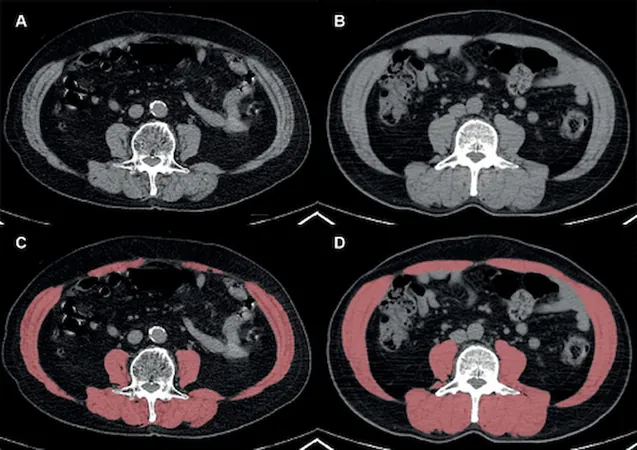
Surprising Findings: Obesity May Actually Enhance Survival Rates for Lung Cancer Patients!
2025-01-29
Author: Jia
Groundbreaking Study Highlights Unexpected Survival Benefits of Obesity in NSCLC Patients
A groundbreaking study involving over 7,000 patients who underwent surgery for non-small cell lung cancer (NSCLC) has revealed that obesity might provide some unexpected advantages for post-operative survival. The research indicates that obese patients without low skeletal muscle mass (LSMM) or myosteatosis, as seen in their CT scans, exhibit a significantly lower risk of mortality compared to their non-obese counterparts.
Published in the esteemed journal *Radiology*, the study analyzed data from 7,076 patients who received curative resection for NSCLC. Among these individuals, 35.5 percent qualified as obese, defined by a body mass index (BMI) over 25. The results showed that, for obese patients with normal CT measured skeletal muscle mass and radiodensity, there was a striking 23 percent decreased likelihood of death when juxtaposed with non-obese individuals.
Lead researcher Ji Hyun Lee, M.D., from Samsung Medical Center and Sungkyunkwan University School of Medicine in Seoul, Korea, remarked: "This study highlights an intriguing connection between obesity, defined by BMI, and enhanced overall survival rates for NSCLC patients undergoing curative procedures."
Key Demographic Insights
The findings were particularly noteworthy for certain demographics. The protective benefits of obesity were most pronounced among men, showing a 28 percent hazard ratio, and among those with a history of smoking, with a staggering hazard ratio of 71 percent. The research suggests that the underlying biology of adipose tissue might play a crucial role in lessening the negative effects of smoking-related toxins.
Three Key Insights from the Study
1. **Obesity Equals Improved Survival Rates**: Obese patients without evidence of LSMM or myosteatosis demonstrated a 23 percent lower risk of death post-surgery for NSCLC, challenging traditional views about obesity being solely detrimental to health.
2. **Men and Smokers Show More Benefits**: The survival advantage associated with obesity was significantly greater in male patients and those who had previously smoked, pointing to the complex interplay between body composition and cancer prognosis.
3. **Reduced Risk of Recurrence**: Over a median follow-up period of nearly 61 months, obese patients also recorded a 13 percent lower risk of NSCLC recurrence or death compared to non-obese individuals, reinforcing the hypothesis that metabolic health may significantly influence cancer outcomes.
Cautions and Limitations
The researchers caution that while these findings are promising, they should be interpreted with caution. The study’s limitations include not conducting longitudinal assessments of weight and muscle status, as well as a limited number of patients who fit the obesity profile with low skeletal muscle mass. It is crucial to understand that these results are drawn from a specific population of Korean patients who predominantly presented with early-stage NSCLC and a lower prevalence of morbid obesity.
As the research community dives deeper into the complex relationship between obesity and cancer outcomes, this study provides a thought-provoking perspective that may reshape future approaches to treatment and patient management. Are we seeing the dawn of a new understanding of obesity in cancer survival? Only time and further research will tell!



 Brasil (PT)
Brasil (PT)
 Canada (EN)
Canada (EN)
 Chile (ES)
Chile (ES)
 Česko (CS)
Česko (CS)
 대한민국 (KO)
대한민국 (KO)
 España (ES)
España (ES)
 France (FR)
France (FR)
 Hong Kong (EN)
Hong Kong (EN)
 Italia (IT)
Italia (IT)
 日本 (JA)
日本 (JA)
 Magyarország (HU)
Magyarország (HU)
 Norge (NO)
Norge (NO)
 Polska (PL)
Polska (PL)
 Schweiz (DE)
Schweiz (DE)
 Singapore (EN)
Singapore (EN)
 Sverige (SV)
Sverige (SV)
 Suomi (FI)
Suomi (FI)
 Türkiye (TR)
Türkiye (TR)